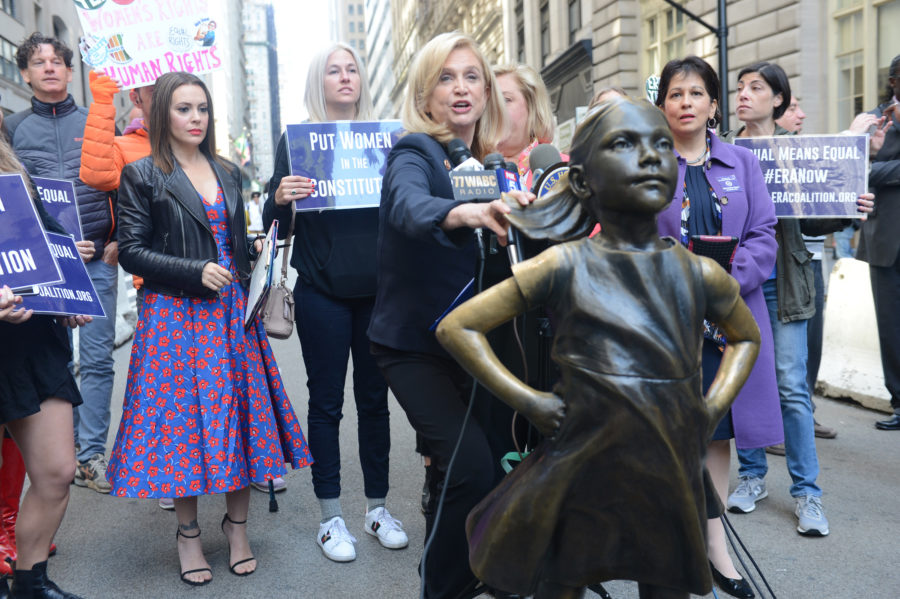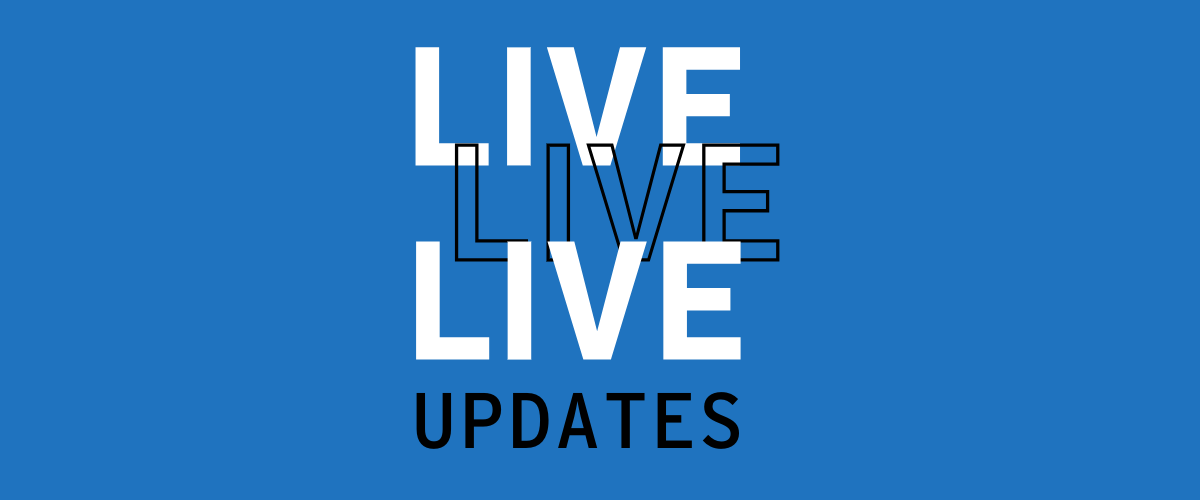We need to stop harassment and discrimination against women in the journalism field
U.S. Rep. Carolyn Maloney, D- N.Y., center, is joined by activist/actress Alyssa Milano, left, and other members of an ERA coalition calling for ratification of the Equal Rights Amendment to the Constitution in a press conference held on Monday, June 4, 2018, by the Fearless Girl statue in Lower Manhattan, New York. (Susan Watts/New York Daily News/TNS)
Mar 29, 2023
During a panel called “Women in journalism: How to lead the media,” I listened to a panel of six women describe their hardships and horror stories about being a woman in journalism: not being taken seriously, identity theft and borderline sexual harassment during interviews.
This struck a chord in me when I learned of how prevalent gender inequity can be in the workplace, specifically journalism. I felt inspired to do my own research.
I believe women should have better support systems in publicly affiliated careers like journalism that protect them from gender discrimination regarding both public and professional settings.
What are the issues women journalists face?
It’s saddening to me as a young woman journalist that what I learned at the conference does concur with a lot of women’s experiences, especially close to home.
“I’ve been mistaken for male colleague’s secretary when answering my own desk line. I’ve received unwanted comments on my appearance. I’ve received unwanted hugs. I’ve been belittled and talked down to,” said Brianna Vaccari, a journalist for the Central Valley Journalism Collaborative and a Fresno State alumna.
Vaccari told The Collegian that most of these experiences took place during her time working for the Merced Sun-Star and The Fresno Bee.
The University of Texas at Austin, surveyed 75 professional journalists, spanning over several countries, including the United States, Taiwan, India, Germany and the United Kingdom in a study.
“Most of the female journalists we interviewed had experienced negative audience feedback that went beyond mere critiques of their work and, instead, often took the form of harassment, targeting them personally with a focus on their gender or sexuality,” the study stated.
Lynn Walsh is an Emmy award-winning journalist and has worked in investigative, data and TV journalism, and is currently working for the Trusting News Project. She was one of the panelists from the seminar I attended.
She told The Collegian that her experience was a little different. It was hard for her to decipher if certain experiences happened to her because of her gender or because of her age, mentioning how she was under 30 years old and managing a journalism team.
“Sometimes it’s hard to differentiate. Was I sometimes not being taken seriously or having to provide more data and push my ideas harder because of my age or my gender?,” Walsh said.
Another survey done by Reach and Women in Journalism found that 75% of women journalists in the UK have been threatened or felt unsafe as a result of their profession and or work being online, resulting in them considering leaving journalism.
“Some examples of what women have suffered included a catfish account sending sexually explicit direct messages on Twitter, someone receiving ‘abusive messages about myself and family, leading to a Twitter pile-on,’ consistent death threats that police were unable to trace, receiving a ‘heap of abuse’ for writing an online piece and one woman feeling suicidal because she was stalked for 12 years,” reported Charlotte Tobitt in the article “Online abuse toll means fifth of women journalists considered leaving industry.”
What are ways to combat gender discrimination in journalism?
“It’s always helpful to talk to colleagues, mentors and friends in journalism about my experiences. It helps me feel understood and validated,” Vaccari said about how she copes with certain instances of uncalled for disrespect.
Walsh also emphasized the importance of mentors. She would go to them for advice and she also looked to secondary resources for help, like the Society of Professional Journalists.
“When you are working in an environment where you do have men who are your managers and ultimate decision makers, it can be more difficult to get stories. Where I saw issues was story selection, like what stories we cover and how stories are covered,” Walsh said.
In newsrooms, voices of women wouldn’t particularly get covered, which is why Walsh said speaking up is so important. A strategy she found that worked, though seemingly obvious, was acknowledging others’ ideas to amplify their voices by agreeing with them or telling them they have a good idea at meetings.
It was also found that some women had developed certain strategies to prevent harassment, such as censoring certain words that could be used in comments on their Facebook pages or being more careful by including a variety of voices in a story to diminish the amount of abuse.
Some positives do come out of being able to resonate with certain demographics, such as being a woman.
“I’ve been able to report a lot on women’s issues because of my lived experience. Certain sources feel more comfortable sharing their experiences with me because they are less threatened around women. Often, survivors of sexual and gender violence also feel more comfortable sharing their experiences with women rather than men,” Vaccari said.
She advises young writers to trust their gut, stand up for themselves, lean on their support systems and take care of their physical, emotional and mental health.
“Something I love about journalism is that every work day is different. Every day you get to work on a different story and interact with different people. Sometimes when I’ve had a negative experience because of my gender, it’s helpful to remember that tomorrow is an opportunity for a better day,” Vaccari said.
Walsh also elaborated on the importance of work-life balance and not forgetting to take care of yourself by establishing boundaries.
“It’s OK to be passionate about it (work)… but so that it doesn’t lead to burnout, set boundaries,” Walsh said. “I think creating those boundaries and then just making sure to clearly communicate those with who you are working with is really, really key.”
Why we need to act now and help women journalists.
You can google “women leaving journalism” and a multitude of different personal accounts, data and results relating to almost every country will pop up. However, support resources scarcely show up.
As a young journalist, I want to arm myself with these resources in order to be prepared in case myself or anyone else finds themselves in a similar situation.
The SPJ Race and Gender hotline provides concrete advice for specific situations entailing race and gender.
The Journalism Trauma Support Network connects journalists with therapists trained to handle occupational-related stress and traumas that come with the profession of journalism.
The Save Journalism Project aims to educate people and support journalists with the work that they do. Their ‘Resources for Journalists’ page offers numerous resources to other foundations for specific situations that journalists may be in.
Walsh emphasized using your experiences and perspective to incorporate your voice in your writing or work.
“Ideally being a woman, whatever your gender is or however you identify, I think it’s important to not leave that at the door and not be afraid to speak up from those perspectives,” she said.








